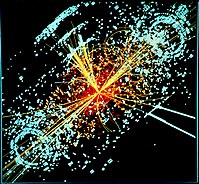Large Hadron Collider reaches milestone
Thursday, April 1, 2010

Image: CMS Media.
The Large Hadron Collider—the world's largest science experiment—shattered records Tuesday by successfully colliding particle beams at a combined energy of 7 teraelectronvolts (TeV). This marks a milestone in the collider's progress, and will usher in the beginning of up to two years of intensive investigations.
In just a few hours, detectors along the LHC's 17-mile tube recorded 500,000 collision events. Two beams of protons were sent in opposite directions, each with an energy of 3.5 TeV, guided by thousands of large electromagnets.
Guido Tonelli, a spokesman for one of the detectors, said "Major discoveries will happen only when we are able to collect billions of events and identify among them the very rare events that could present a new state of matter or new particles."
The LHC will eventually shut down for about a year to prepare for 14-TeV collisions. Scientists will ultimately sift through information on billions of collision events, in hope that the results will lead to a "new era in science".
Related news
- "Large Hadron Collider restarted" — Wikinews, November 21, 2009
- "Large particle accelerators to explore the frontiers of physics" — Wikinews, September 16, 2008
Sources
- "LHC Glossary" — CERN,
- "Cern LHC sees high-energy success" — BBC News Online, March 30, 2010
- "Think making two bullets collide is difficult? Then try doing it at the subatomic level" — The Irish Times, April 1, 2010